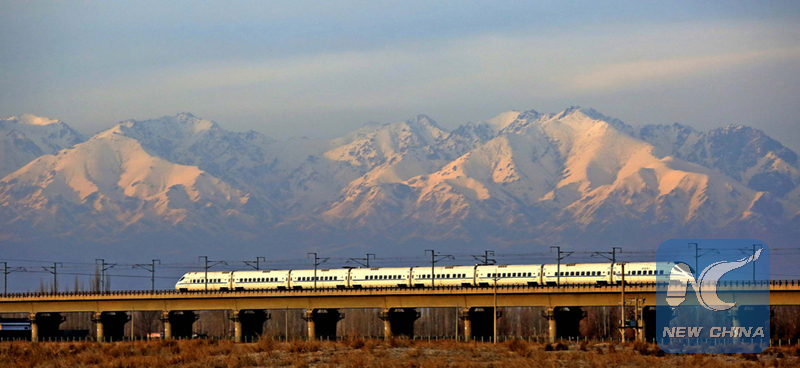China's economic performance challenged
china.org.cn / chinagate.cn by Wei Jianing, November 28, 2016 Adjust font size:
|
|
| A high-speed train runs past the Tianshan Mountain in northwest China's Xinjiang Uygur Autonomous Region, Dec. 3, 2015. [Photo/Xinhua] |
Massive emigration and outbound investments despite negative interest rates in overseas markets should alert the Chinese government to scrutinize economic performance amid the downward tendency.
I am really concerned about people's misinterpretation of the phrase "New Normal," which has been so taken for granted that an exploration of national economy's real problems can make no progression.
China's economy, which is still critical in a process of transition, should be studied in three respects -- by growth rates, by structures and by the average income per capita or, in other words, resource distribution models. We need to learn from the lessons of East Asian economies, and reconsider our "New Normal" phenomenon.
Is there a crisis emerging? A quantitative analysis we did last year assessed the possible risks that may affect Chinese economy during the 13th Five Year Plan period (2016-2020). But now I'm afraid that it is time to work on countermeasures against crisis.
Let's take three driving forces -- exports, consumption and investment -- as examples. The economic downturn across the world has resulted in a diminution of overseas demands, which has heavily affected exports and can hardly be improved by China alone.
Meanwhile, the decline of consumption has affected various industries. The consumption that the domestic economy has mostly relied on in the past few years has sent emergency signals towards the national economy indicating possible further deteriorating in the future.
Investment from the private sector has dropped sharply. Despite negative interest rates in some foreign countries, which seem less lucrative than the positive rates inside the country, considerable investment has been poured into overseas markets. Meanwhile, emigration has kept growing. What all these mean?
We should not be so blind to feel upbeat about the economy, taking the downward tendency as that will end if we can put up with it for a short while. Otherwise, when a real crisis arrives, any move to be taken at that time will not work.
When Chinese economists use the term "New Normal," they are in no attempt to deny economic growths; on the contrary, what they run against is the single-minded and radical pursuit of economic growth, which should be replaced by sustainable growth focusing on economic restructuring.
A wise government should always keep a distance from the markets and stay alert not to fall into "the Tacitus Trap," referring to governments that lose their credibility and can no longer convince the public even when they speak the truth.
I believe the Chinese economy remains robust in many sectors, such as education, healthcare and the caring for the elderly which are all in short supply. The economy can rebound and even maintain moderate or high growth as long as its potential can be truly released with the progress of the supply-side reform.
Wei Jianing is a researcher from the Macro Economic Research Department of the Development Research Center of the State Council.
The article was translated by Wu Jin. Its original unabridged version was published in Chinese.
Opinion articles reflect the views of their authors only, not necessarily those of China.org.cn.
